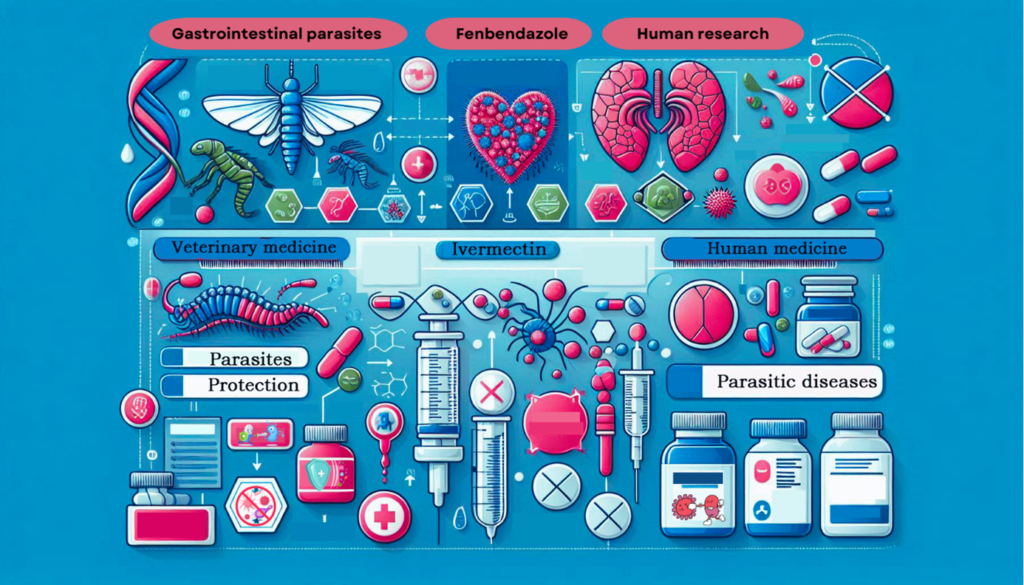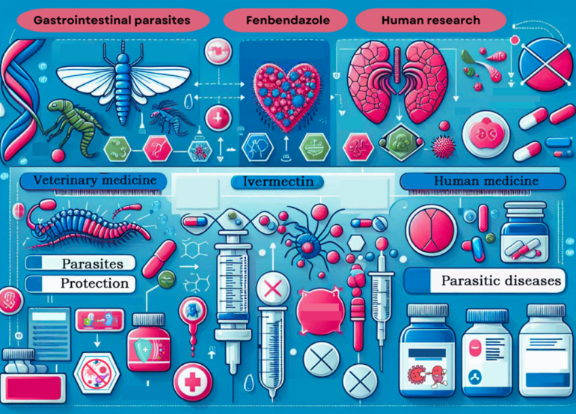The application of non-traditional medical therapies has received a lot of attention throughout the last few years. Among these, the potential of ivermectin and fenbendazole in human medicine has been investigated after they were first created for use in animals. With the goal of giving a thorough grasp of their uses and differences, this article will examine and contrast these two medications.
Analyses Erythromycin
Veterinary and human medicine both extensively employ the antiparasitic drug ivermectin. Developed originally to treat human parasitic diseases such as river blindness and lymphatic filariasis, it is today a mainstay of veterinary treatment for controlling animal parasites.
Practice Application and Benefits
In human medicine: Licenced to treat specific parasitic diseases is ivermectin. It is an excellent antiparasitic for head lice, strongyloidiasis, and scabies.
Veterinary medicine uses ivermectin to treat a variety of internal and external parasites and protect animals from heartworm disease.
Ongoing Research and Controversies: There is a raging discussion about the possible application of ivermectin in COVID-19 treatment. Early research points to major advantages, but a lack of thorough data has prevented the FDA and WHO, two well-known health organizations, from approving it for this usage yet.
Examining Fenbendazole More Specifically
Fenbendazole is an additional antiparasitic medication largely used in veterinary medicine to treat gastrointestinal parasites in cattle, cats, and dogs. Although fenbendazole is not allowed for human usage, like ivermectin, it has attracted attention for possible off-label benefits.

Clinical Significance
Veterinary Medicine: Among other intestinal parasites, tapeworms, hookworms, and roundworms are all well treated with fenbendazole. Its great effectiveness makes deworming pets and animals a frequent use for it.
Future Uses and Research Early study on the anticancer properties and anecdotal evidence have led to the usage of fenbendazole in humans. While interesting, more in-depth clinical research is required to confirm the efficacy and safety of these assertions.
Comparing the Ivermectin and Fenbendazole Action Mechanisms:
When ivermectin binds to glutamate-gated chloride channels in the nerve and muscle cells of the parasites, they become paralyzed and die.
Fenbendazole prevents the parasite from growing microtubules, which upsets its energy metabolism and results in starvation and death.
Risk and Unfavourable Reactions:
• Ivermectin: Generally speaking, both humans and animals may handle it well when used properly. Usually, the adverse effects are minimal and controllable and include nausea, dizziness, and little skin reactions. Although when taken as prescribed, an overdose may have somewhat serious neurological consequences.
• Fenbendazole: Given its limited documented negative effects, it is thought to be safe for animals. Still, as it is not authorized for use on people, its safety profile in humans is not well-documented.
Position of Complementary Therapies in Medicine
Interest in ivermectin and fenbendazole indicates a more significant tendency in investigating alternative therapies. Even if these medications might have certain advantages, particularly in animal settings, discussion and research on their use in human medicine are currently ongoing. Before thinking about using such treatments off-label, care must be taken, using evidence-based techniques and extensive medical consultation.
Opinion
Fenbendazole and ivermectin find use in human and veterinary medicine. Both have successfully treated parasite infections in animals, but using them in humans—especially for diseases not previously reported—needs further investigation and prudence. People who keep up to date and evaluate new research critically may make better decisions about their health and available treatments.
References:
- World Health Organization. (2021). Ivermectin and COVID-19: How should it be used? WHO.
- U.S. Food and Drug Administration. (2021). Why You Should Not Use Ivermectin to Treat or Prevent COVID-19. FDA.
- Veterinary Parasitology. (2018). Fenbendazole: Pharmacokinetics and Metabolism. ScienceDirect.






